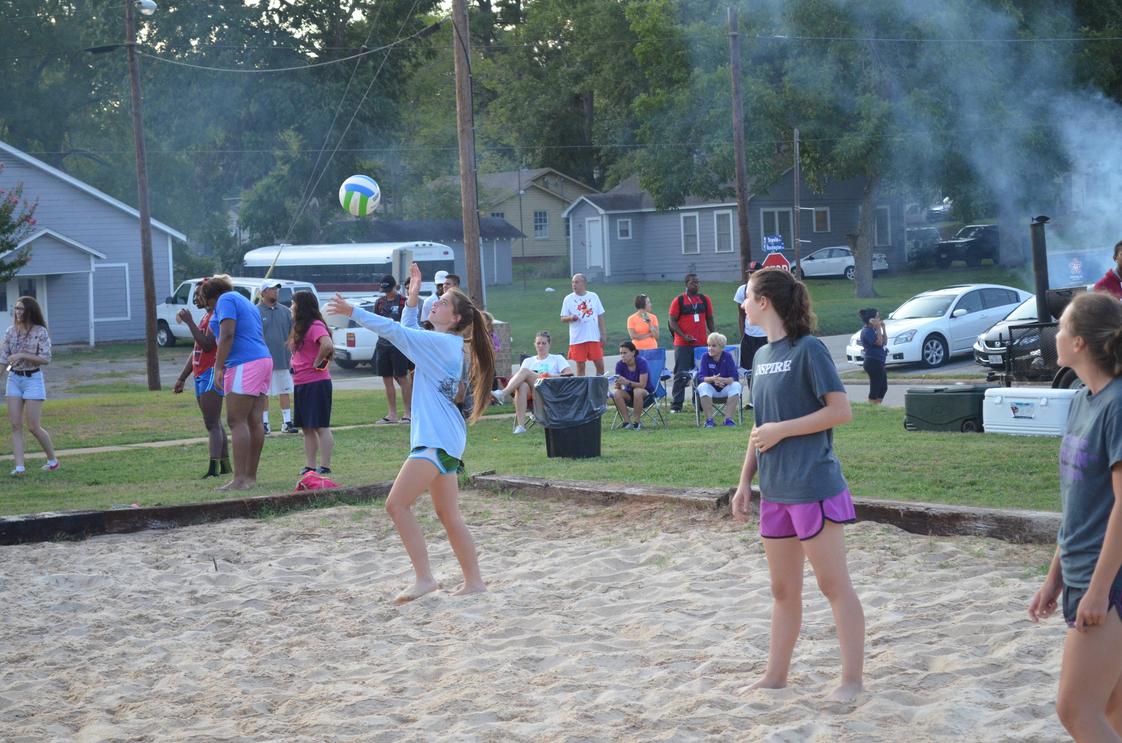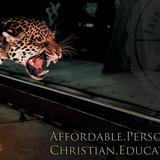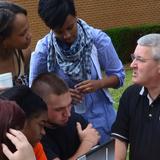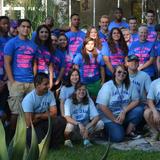- Jacksonville College - a Christian, independent, coeducational, two-year liberal arts college owned and operated by the Baptist Missionary Association of Texas, is committed to our students realizing the full potential of their abilities and pursuing lives of service to the human community, through the effective integration of faith and learning in a distinctly Christian environment.
- Jacksonville College exists to provide a quality education from a biblical worldview that challenges minds, transforms lives, and equips students for servant leadership and lifelong learning.
School Highlights
Jacksonville College-Main Campus serves 1,153 students (25% of students are full-time).
The college's student:teacher ratio of 20:1 is lower than the state community college average of 23:1.
Minority enrollment is 78% of the student body (majority Hispanic), which is more than the state average of 74%.
Quick Stats (2025)
- Enrollment: 1,153 students
- In-state tuition: $7,230
- Out-state tuition: $7,230
- Student:teacher ratio: 20:1
- Minority enrollment: 78%
- Source: Integrated Postsecondary Education Data System (IPEDS)
Top Rankings
Jacksonville College-Main Campus ranks among the top 20% of public schools in Texas for:
Category
Attribute
Diversity
School Resources
School Overview
The teacher population of 58 teachers has stayed relatively flat over five years.
Jacksonville College-Main Campus
(TX) Community College Avg.
Carnegie Classification
Associate's Colleges: High Transfer-High Nontraditional
Baccalaureate/Associate's Colleges: Associate's Dominant
Institution Level
Less than 2 yrs
At least 2 but less than 4 years
Institution Control
Public
Private, for profit
Total Faculty
58 staff
262 staff
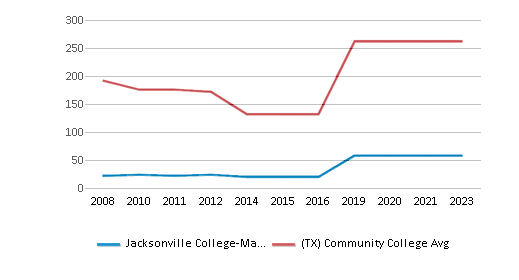
School Calendar
Student Body
The student population of Jacksonville College-Main Campus has grown by 142% over five years.
The student:teacher ratio of 20:1 has increased from 8:1 over five years.
The Jacksonville College-Main Campus diversity score of 0.87 is more than the state average of 0.70. The school's diversity has grown by 23% over five years.
Total Enrollment
1,153 students
1,396 students
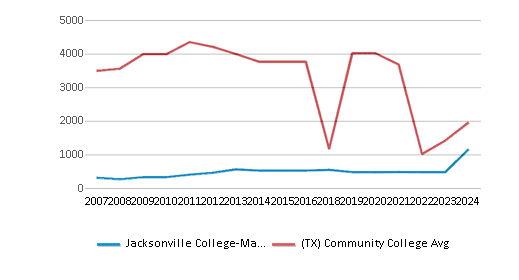
Student : Teacher Ratio
20:1
23:1
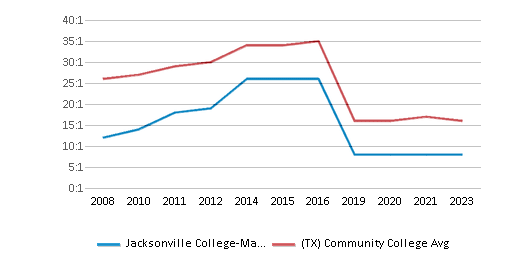
# Full-Time Students
287 students
890 students
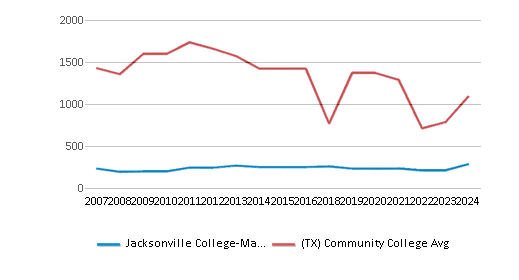
# Part-Time Students
866 students
4,022 students
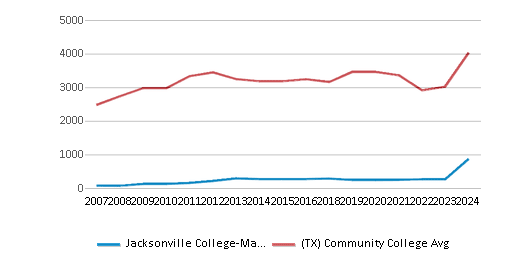
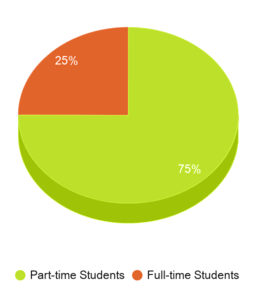
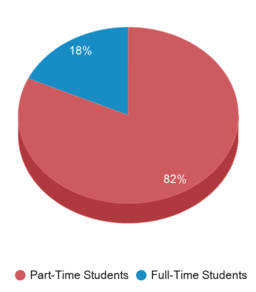
# Enrollment Undergraduate
115 students
403 students
# Full-Time Undergraduate Students
287 students
890 students
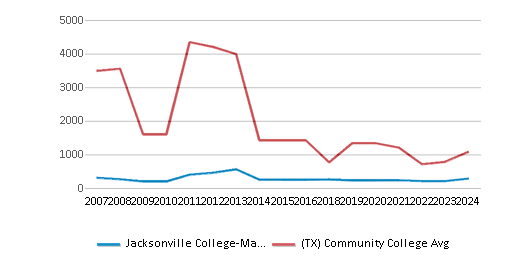
# Full-Time Graduate Students
n/a
40 students
# Part-Time Undergraduate Students
n/a
4,022 students
# Part-Time Graduate Students
n/a
47 students
Total Dormitory Capacity
n/a
252 students
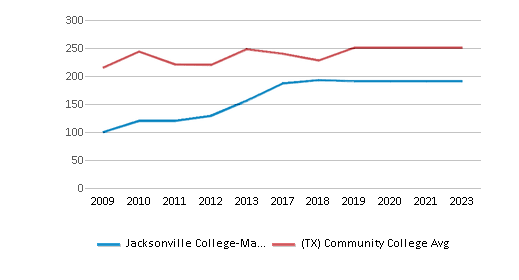
% American Indian/Alaskan
n/a
n/a
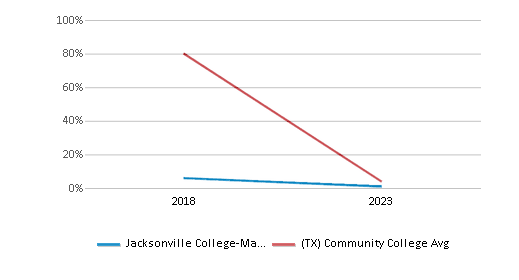
% Asian
1%
6%
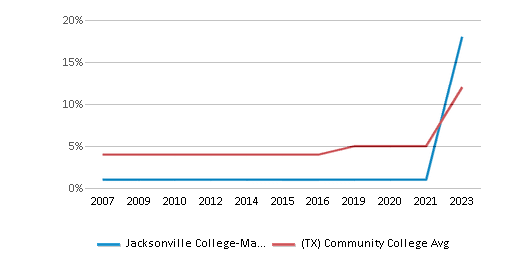
% Hispanic
24%
46%
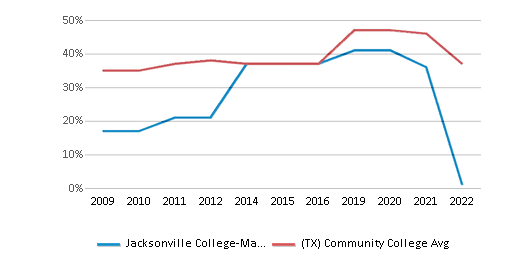
% Black
16%
14%
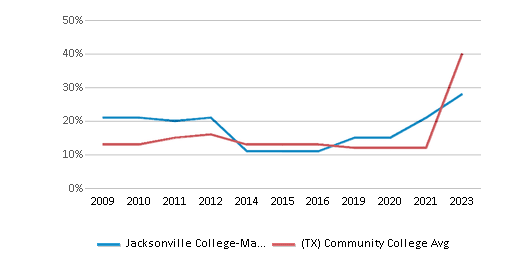
% White
22%
26%
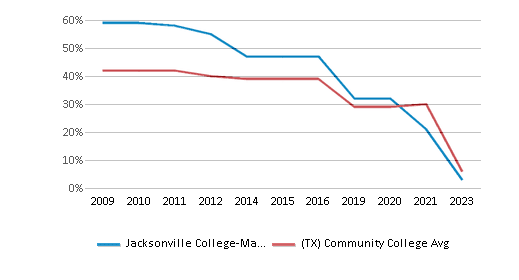
% Hawaiian
n/a
n/a
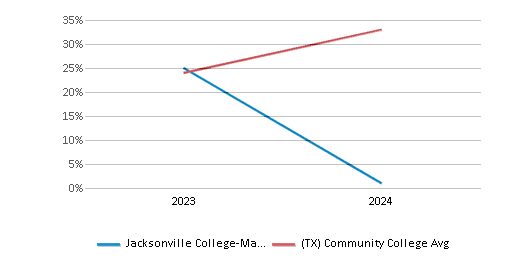
% Two or more races
3%
3%
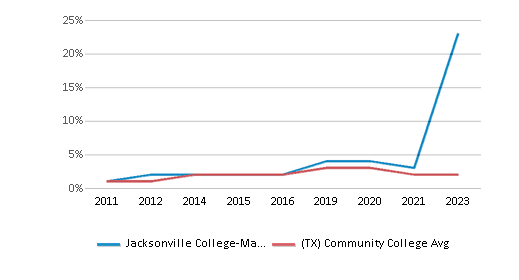
% Non Resident races
2%
2%
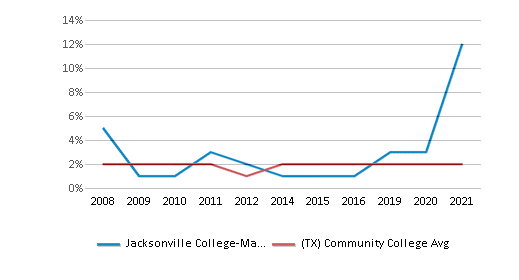
% Unknown races
32%
3%
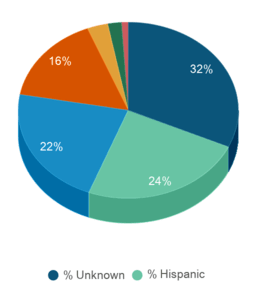
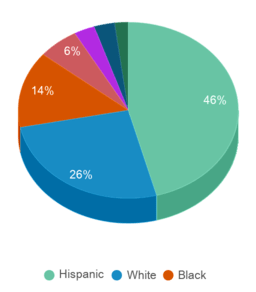
Diversity Score
0.87
0.70
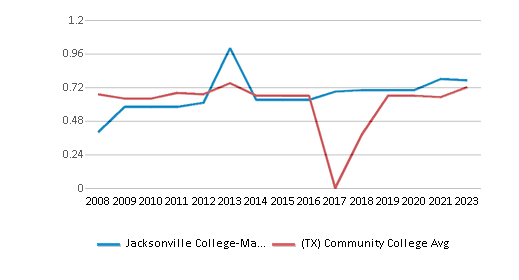
College Completion Rate (Students who graduate in less than 4 years)
0.3451%
0.5469%
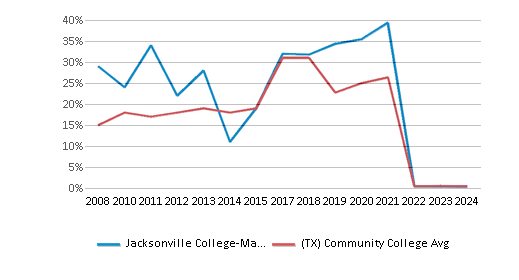
College Completion Rate (Students who graduate in 4 years or more than 4 years)
n/a
0.3357%
Average Graduate Earnings (10 Years)
$28,300
$34,600
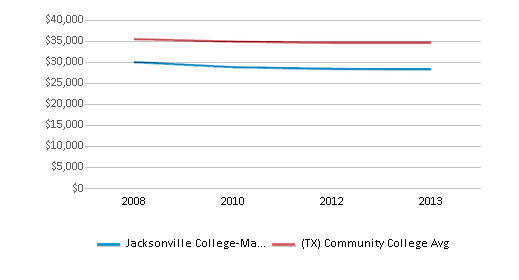
Tuition and Acceptance Rate
The public in-state tuition of $7,230 is more than the state average of $3,316. The in-state tuition has declined by 9% over four years.
The public out-state tuition of $7,230 is more than the state average of $5,750. The out-state tuition has declined by 9% over four years.
In-State Tuition Fees
$7,230
$3,316
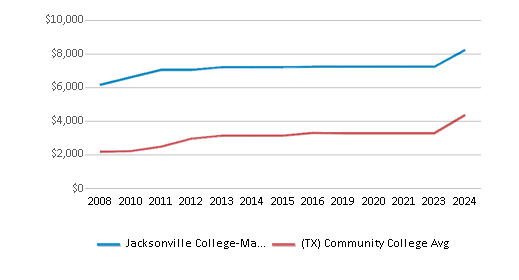
Out-State Tuition Fees
$7,230
$5,750
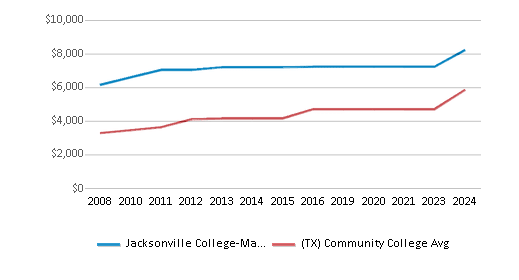
Tuition Notes
12 hours = $5,040.00
% Students Receiving Some Financial Aid
95%
84%
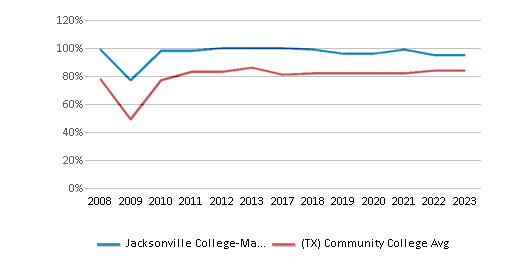
Median Debt for Graduates
n/a
$10,765
Median Debt for Dropouts
$2,938
$5,250
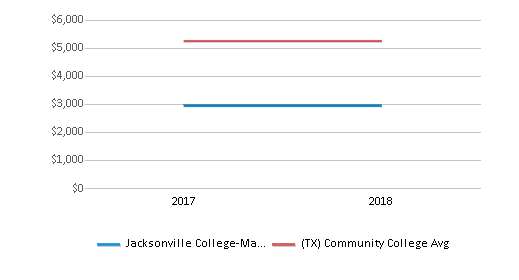
Acceptance Rate
n/a
81%
Sports
Total Sports Offered
4 sports
Sports
Basketball, Golf, Soccer, Tennis
Extracurriculars
Total ExtracurricularsTotal Extra-curric.
4 extracurriculars
ExtracurricularsExtra-curric.
Club or Organization:
Ministerial Alliance, Phi Theta Kappa honor society
Arts and Music Programs:
Choir, Cross Act Theatre
Ministerial Alliance, Phi Theta Kappa honor society
Arts and Music Programs:
Choir, Cross Act Theatre
Source: 2024 (or latest year available) Integrated Postsecondary Education Data System (IPEDS) , School Administrators
School Notes
- Jacksonville College [locally known as Jacksonville Baptist College] was established in 1899 as a 4-year college. In 1918, it was reorganized as a junior college and has remained so since. The college is located in a city of 14,000 inhabitants, nestled in the beautiful, rolling hills of East Texas. The city boasts several industries, a prosperous farming region, friendly people, a fine system of public schools, a national seminary and many fine churches. The college offers Associate Degree in the liberal arts and sciences. Jacksonville College is accredited by the Commission on Colleges of the Southern Association of Colleges and Schools to award the Associate Degree and the Junior College Diploma.
Frequently Asked Questions
How much does Jacksonville College-Main Campus cost?
Jacksonville College-Main Campus's tuition is approximately $7,230 for In-State students and $7,230 for Out-State students.
What schools are Jacksonville College-Main Campus often compared to?
Jacksonville College-Main Campusis often viewed alongside schools like Tyler Junior College by visitors of our site.
What sports does Jacksonville College-Main Campus offer?
Jacksonville College-Main Campus offers 4 interscholastic sports: Basketball, Golf, Soccer and Tennis.
What is Jacksonville College-Main Campus's ranking?
Jacksonville College-Main Campus ranks among the top 20% of community college in Texas for: Diversity in US community colleges and Percent of students receiving financial aid.
Recent Articles

Obtaining Your Bachelor's Degree at a Community College
Explore the evolving landscape of community colleges offering bachelor's degrees, addressing affordability, accessibility, and workforce needs.

A to Z of Community College Certificates and Courses
From business and healthcare to technology and skilled trades, the article showcases the breadth of options available to students seeking to enhance their knowledge, develop new skills, or pursue career advancement.

What is a Community College?
This comprehensive guide explains what a community college is, its history, and its role in higher education. It covers the types of programs offered, differences from four-year colleges, benefits of attending, and important considerations for prospective students, providing valuable insights for those exploring educational options.

